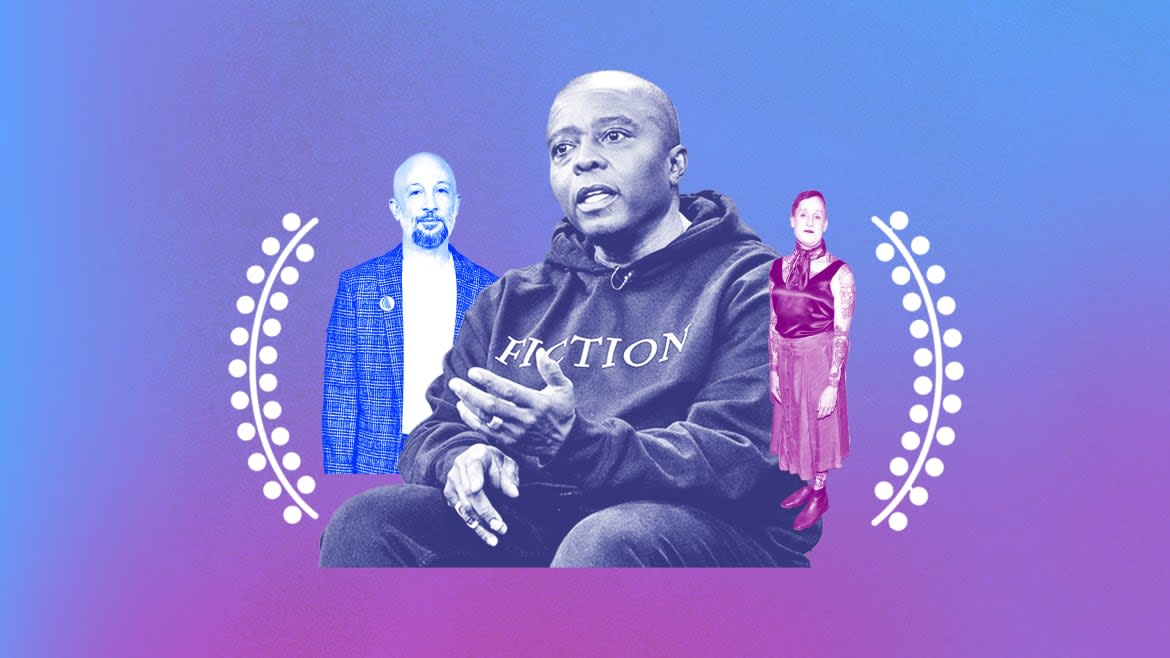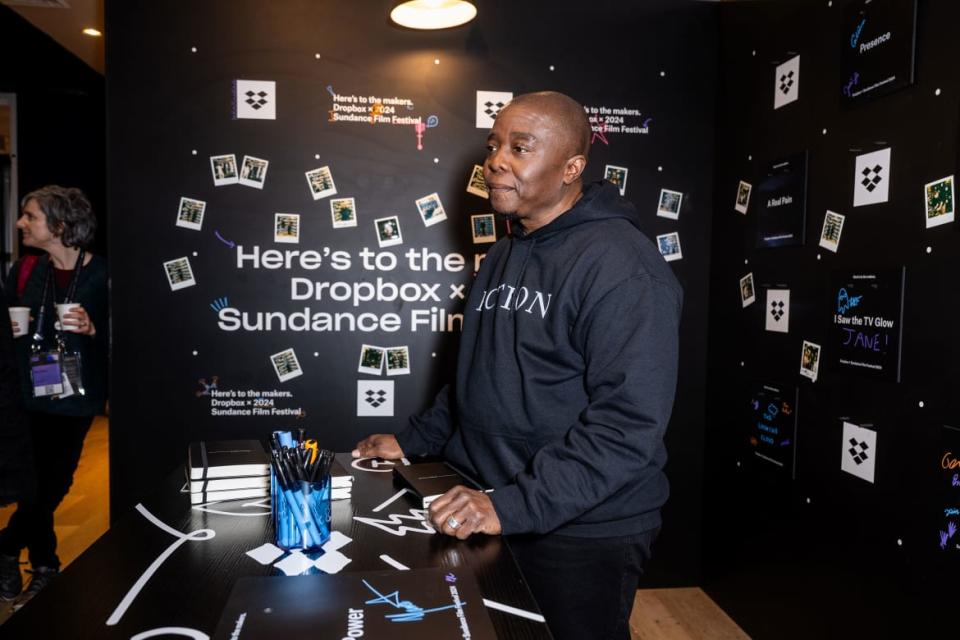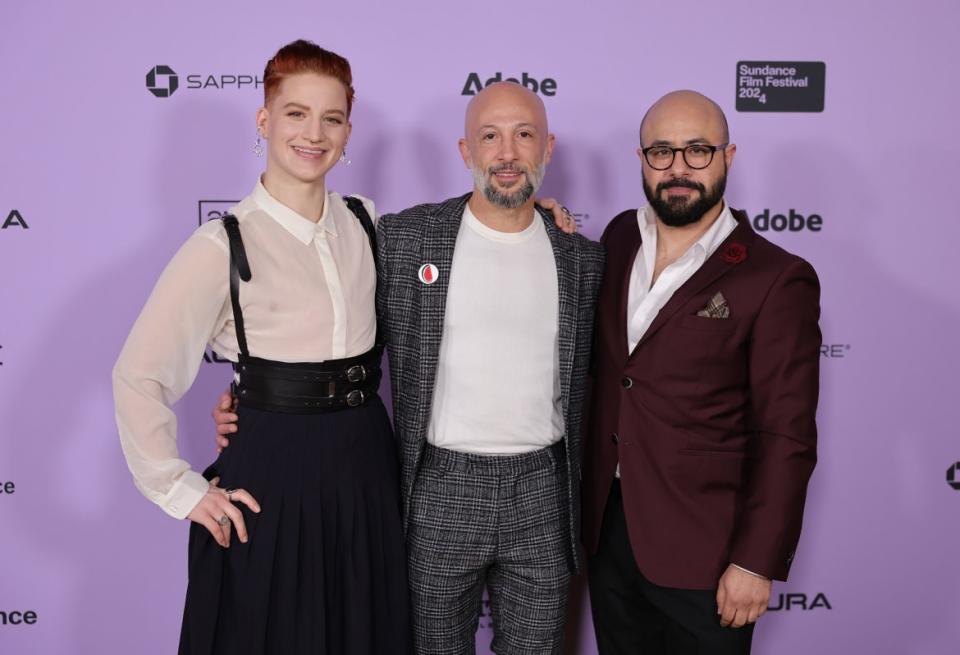Utah's Anti-Trans Bathroom Bill Rattles Sundance

- Oops!Something went wrong.Please try again later.
- Oops!Something went wrong.Please try again later.
- Oops!Something went wrong.Please try again later.
- Oops!Something went wrong.Please try again later.
Last week, a cruel kind of irony hung over Park City, Utah like an oncoming snowstorm. While the Sundance Film Festival celebrated productions from several accomplished LGBTQ directors, including buzzy releases like Jane Schoenbrun’s sophomore film I Saw the TV Glow, Utah’s state legislature passed the first “bathroom ban” of the year. If Gov. Spencer Cox chooses to sign the bill into law, it will bar transgender students from using restrooms and locker rooms that match their gender identities. It would also prohibit trans people of all ages from accessing changing rooms in government-run facilities. (Gov. Cox did not respond to The Daily Beast’s request for comment.)
The tension between these two simultaneous events highlights a stark reality: As vital as it certainly is for LGBTQ people to be seen and heard in our art and media, that’s only half the battle. Strong legal protections must go hand-in-hand with that visibility.
As HB 257 worked its way through the House and then the Senate last week, Sundance seemed to avoid addressing the legislation directly. On Wednesday, the organization posted a portion of Executive Director Eugene Hernandez’s speech introducing an anniversary screening of The Life and Times of Harvey Milk on its Instagram Story. In the video, Hernandez affirmed the fest’s dedication to inclusivity and noted the rise of anti-trans bills across the country but did not mention HB 257 specifically. Apart from that ephemeral post, Sundance seemed to stay mum, prompting some filmmakers to press for a more substantial show of support.
FWD: @sundancefest pic.twitter.com/78Dtl5Eggs
— Jane Schoenbrun (@sapphicspielbrg) January 23, 2024
On Monday afternoon, a representative for Sundance provided The Daily Beast with a statement that confirmed the organization’s ongoing support for transgender artists but once again did not condemn HB 257 or even mention it by name.
“We unequivocally stand behind Sundance’s core and immutable value—that everyone who is a part of our global community should be able to participate comfortably in every facet of our programming, and that includes making sure that all feel their needs are met in our venues,” Sundance’s statement reads. “We are champions for diverse voices within our industry, and many of the films at Sundance show the importance of fostering an inclusive environment. Sundance artists change hearts and minds, sparking new levels of empathy and understanding that lead to social change.”
The statement continues: “We believe in the power and possibility that comes along with lifting up the voices of transgender artists and have sought out, supported, and awarded their artistic visions. We are continuing to evaluate options as we look ahead and work to make sure Sundance is safe, welcoming, and inclusive to all our artists, staff, volunteers, and audiences—those who travel to Utah and those who reside here throughout the year. We will continue to express our concerns to elected officials and commit to guaranteeing a safe and secure place for Sundancers in years ahead.”
Between Friday and Monday morning, the Daily Beast spoke with three trans filmmakers who’ve worked with Sundance Film Festival before. All of them emphasized the platform that Sundance has long extended to their community.
“Trans people are very creative and very talented, and it's wonderful to celebrate our work,” said Jude Harris, who has produced multiple Sundance debuts including the TV series $5 Cover, the short film “Myrna the Monster,” and the feature documentary Half the Picture. She later added that she’s “never seen so many trans filmmakers highlighted in a festival that’s not inherently an LGBTQ film festival.”
At the same time, Harris couldn’t help but wonder why an organization that has long uplifted these voices had suddenly fallen so quiet last week. She’d emailed Sundance last Monday, urging the organization to take a stand. In a follow-up email to The Daily Beast on Tuesday, she expressed her disappointment with Sundance’s statement.
“I don’t understand why an institution that espouses progressive values can’t directly speak out for their community,” Harris wrote. “It’s sad to me that the Salt Lake City Council and Mayor are better advocates for trans rights than an arts institution with a mission to support marginalized voices. I hope Sundance is able to find its heart and its spine before things in Utah get worse for trans Sundance filmmakers, staff, volunteers, and their families.”
Harris added, “It seems like these messages are being crafted by people who don’t understand the gravity of anti-trans legislation. Sundance has so much influence and an opportunity to be a model of allyship. I’d love to see the festival rise to the occasion.”
I Saw the TV Glow and We’re All Going to the World’s Fair director Jane Schoenbrun also provided a statement to The Daily Beast. “Sundance has yet to publicly acknowledge this bill, let alone condemn it,” they wrote. “I would like to call on them to do both, and to use their economic and cultural power to publicly urge Governor Cox not to sign this egregious attack on Utah’s trans population into law. When the basic human rights of our most vulnerable are stripped away and our cultural institutions continue on with business as usual, it is hard not to feel the creep of fascism closing in around us.”
In other words, and as Harris put it during our initial interview Friday, “This comes from a place of love, but if you’re going to be an ally, be an ally in the spotlight.”
Like Harris, director Yance Ford—who debuted his documentary essay Power at Sundance this year and whose Oscar-nominated documentary Strong Island won a Special Jury Award at Sundance 2017—expressed profound gratitude for the platform Sundance has historically provided LGBTQ artists. His own relationship with the organization stretches back to 2006, when he became a creative producing fellow with the Sundance Institute, and he credits the organization with helping to provide him the space, time, and resources to become the filmmaker that he is today.
Speaking with The Daily Beast on Friday, Ford expressed his belief that Sundance would come down on the “right side” of the HB 257 issue by supporting trans rights. He also emphasized the economic power that Sundance wields in Park City and its surrounding areas.

Yance Ford at the IndieWire Sundance Studio.
According to an economic impact report from 2023, last year’s Sundance Film Festival contributed $118.3 million to Utah’s gross domestic product and 1,608 jobs for residents within the state. In 2020, before the COVID-19 pandemic disrupted the festival’s usual attendance, the reported numbers were even higher: $167.5 million in GDP and 2,730 jobs.
“The Sundance Film Festival brings a lot of money into the state of Utah,” Ford said. “It brings a lot of money into Park City.” Given the Sundance Institute’s financial heft, Ford said, the non-profit is “in a position to make their position on this bill known.”
That said, the director added, the bigger question might be whether any person or organization’s dissent would sway lawmakers at all.
“If comments or expressions of opposition to this bill were going to stop it from passing, it would already have failed,” Ford said, pointing to the crowd of protestors who turned up at the state capitol in Salt Lake City to protest the bill. Regardless of public opinion, he added, “I think it's also really clear that the politicians in the Utah House and Senate are hellbent on passing this legislation.”
This is the third year in a row that Utah’s lawmakers have attacked trans rights. Last year, the state banned gender-affirming surgeries for trans minors and put an indefinite pause on hormone therapy and puberty blockers. In 2022, state lawmakers also barred trans athletes from girls’ sports. (Months after the sports ban took effect, a judge reversed the decision, pending legal challenges.) Of course, the problem also extends far beyond Utah.
Right now, the ACLU is tracking 381 anti-LGBTQ bills across the U.S., and as of last November, the Human Rights Campaign reported that more than one-third of trans youth lived in states that had passed bans on gender-affirming care. According to The Trevor Project, these bills have had a direct impact on mental health; in a poll published last January, 86 percent of trans and nonbinary youth said that the debates surrounding anti-trans bills had negatively affected their mental health. One in three young trans respondents reported that they did not feel safe to seek medical attention when they were sick or injured.
Marina Lowe, Policy Director for Equality Utah—the primary LGBTQ civil rights and advocacy organization in the state—noted that bills similar to HB 257 have, so far, gone largely unenforced in other states that have passed them. Still, she told The Daily Beast, such legislation “takes us down a dangerous road where we are sort of giving license to the public to sit in judgment and to assess people's gender based on their appearance.”
In other words, bills like HB 257 encourage individuals to speculate on whether any given person “looks feminine enough or masculine enough to exist in certain spaces or to participate in certain activities,” as Lowe put it. That attitude obviously harms trans people, and it also threatens anyone who might style or carry themselves in ways that defy a rigidly defined set of rules.
The risks are not only theoretical. Just last week, The Salt Lake Tribune reported that a parent had interrupted a junior varsity girls basketball game to challenge one of the players’ eligibility on the basis of her gender. Even after principals from both schools assured the father that the player had uploaded her birth certificate as required, he was reportedly not satisfied.
Lawmakers have amended HB 257 to prevent any student from facing criminal charges simply for using public school bathrooms that align with their gender identity. Lowe also noted that as it exists now, the bill includes provisions to prevent false reporting. Still, she observed, “All of that happens on the back end.”
Legislators might’ve tweaked HB 257 last week, but as Harris points out, not everyone will necessarily know the nuances of the law. “For those who want to make life difficult for trans people, somebody in a public place that just knows there's a bathroom ban may not parse the details of the bathroom ban when they call the police or eject a trans person from a venue,” the filmmaker said. “And by then that person has been humiliated, often faced physical violence, and the damage is done whether or not they ultimately serve a six-month sentence.”
To make matters worse, the logic underpinning bathroom bans has already been debunked. In 2018, a study from the Williams Institute at UCLA School of Law found there was no link between trans-inclusive bathroom policies and public safety. Before bathrooms became a favorite right-wing battleground against trans people, racists and homophobes made the same arguments to bar people of color and gay people.
Jules Rosskam, whose documentary Desire Lines premiered at Sundance Film Festival last week, called the anti-trans bathroom arguments “a dog whistle” for GOP candidates.
“It's a rallying cry,” Rosskam said, “and they've been doing this for a number of years. And it's working. They're just sticking with what works.” He himself still feels anxiety when entering a public restroom, he said, a carry-over feeling from getting thrown out of bathrooms during the first half of his life, before he could “pass.”

Theo Germaine, Director Jules Rosskam and Aden Hakimi attend the "Desire Lines" Premiere during the 2024 Sundance Film Festival.
Like Ford and Harris, Rosskam praised Sundance for its inclusivity. “The number of queer and trans filmmakers who had films in the festival this year—given the percentage we make up of the population, we are massively overrepresented, which is great,” he said. “I can almost never say that.”
When asked to unpack the distinction he sees between trans visibility and trans safety, however, Rosskam echoed an idea that lies at the core of countless articles published by trans people and advocates over the years. As empowering and important as it might be to see oneself on screen, that experience alone does not equate to political liberation. Without adequate protections against prejudice, more visibility can also leave a community more vulnerable to attack.
“There's a misconception that visibility always equals possibility,” Rosskam said, “and it doesn’t. … A lot of people are safer when they are invisible to the state, if the state wants to kill you.”
It might be tempting to suggest that Sundance should leave Utah, should the bathroom bill take effect. At the same time, that thinking essentially abandons Utah natives threatened by this legislation. While the news coming out of the state has certainly distressed Ford, he also recognized the privilege he has in being able to hop on a plane and fly home to New York.
“The kids in Utah who can't access gender affirming care, they don't have the option to get on a plane and go somewhere else,” he said. “The trans women and girls who've been barred from sports, they don't have the option to get on a plane and go somewhere else.”
As Harris noted, Sundance is in Utah, and South by Southwest, another popular film festival, takes place in Texas—where Gov. Greg Abbott signed an anti-trans sports bill into law in 2021. “The power of these organizations is to have the cultural conversation that introduces people to ideas that they’re not used to,” Harris said. “...The solution has to be to stay and find a way to peacefully coexist.”
Get the Daily Beast's biggest scoops and scandals delivered right to your inbox. Sign up now.
Stay informed and gain unlimited access to the Daily Beast's unmatched reporting. Subscribe now.

